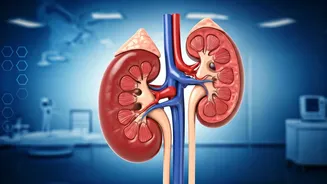Dehydration: A Silent Threat
One of the most insidious threats to kidney health is chronic dehydration. It's often underestimated how crucial adequate fluid intake is for the kidneys
to function correctly. When the body lacks sufficient water, the kidneys struggle to effectively filter waste products from the blood, potentially leading to a buildup of toxins. Over time, this can cause damage to the kidney tissues and lead to various kidney-related issues. The solution is straightforward: ensure you're drinking enough water throughout the morning. Try keeping a water bottle nearby and sipping from it regularly. The exact amount of water needed varies from person to person, but aiming to drink a glass or two of water soon after waking up, and continuing to drink consistently throughout the morning, can make a significant difference. Pay attention to thirst cues, and don’t wait until you’re parched to take a drink.
Excess Salt: Kidney's Enemy
Excessive salt consumption is another significant risk factor for kidney problems, a habit that many people often overlook in their daily routine. High sodium intake leads to increased blood pressure, placing undue stress on the kidneys. As blood pressure increases, the kidneys must work harder to filter blood, which can accelerate the decline in kidney function. Many processed foods and packaged snacks are loaded with salt, so reading food labels and choosing low-sodium options is important. Seasoning your food with herbs and spices instead of salt will also help significantly. Gradually reduce salt intake over time to allow your taste buds to adjust. Being mindful of sodium levels in your diet is a simple yet powerful strategy for protecting kidney health.
Holding Urine: A No-No
Ignoring the urge to urinate is a habit that can have surprisingly detrimental effects on your kidneys. Holding urine for extended periods can allow bacteria to multiply in the urinary tract, leading to infections. These infections can, if untreated, eventually spread to the kidneys and cause significant damage. Frequent urination is a sign of good kidney function. If you find yourself holding urine for long periods, try to develop a habit of regular bathroom breaks. Always answer the call of nature promptly. This simple practice will go a long way in reducing the risk of urinary tract infections and protecting the overall health of your kidneys.
Overdoing Painkillers: Caution!
The over-the-counter painkillers we often reach for can be remarkably harmful to the kidneys if used excessively or for long durations. Regularly taking nonsteroidal anti-inflammatory drugs (NSAIDs) like ibuprofen or naproxen can reduce blood flow to the kidneys, potentially causing damage, especially in individuals with existing kidney problems. These medications should be used sparingly and only when necessary. Always follow the recommended dosage guidelines, and never exceed them. If you need pain relief, explore alternative options such as acetaminophen (paracetamol), which has a lower risk of affecting kidney function, but consult with a doctor. Always consult with a healthcare provider before taking any medication.
Skipping Breakfast: A Risk
The final morning habit to consider is neglecting a nutritious breakfast. While the direct link between skipping breakfast and kidney health may not be as immediately apparent as other habits, it can contribute to imbalances in your overall health that subsequently impact kidney function. A balanced breakfast helps regulate blood sugar levels and can prevent overeating later in the day, which can put a strain on the kidneys. A healthy breakfast should include a balance of proteins, complex carbohydrates, and healthy fats. It also promotes overall health and weight management, indirectly supporting kidney function. Making a conscious effort to eat a well-rounded breakfast each morning can be a significant step toward improving your overall health and well-being, including the health of your kidneys.





















